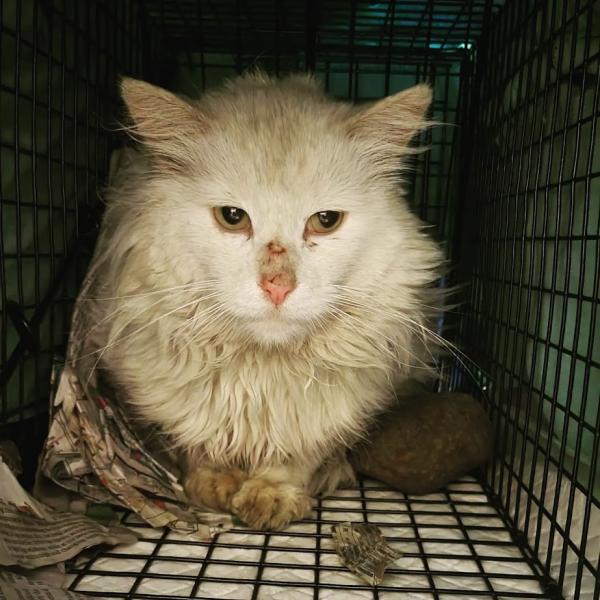
The life of a stray cat is not an easy one, challenged by harsh weather conditions, dangerous predators, and no place to call home. Male cats often find themselves in rough fights that can lead to serious injuries, which often go untreated. Unfixed female cats can have up to five litters of kittens a year. Only 25% of stray kittens survive their first year, according to PDX Cat Trapper. Stray cats are also frequently mistreated by the people they encounter and often do not receive decent care. The conditions faced by feral and stray cats may be easy to ignore when they are out of sight, but Portland’s animal rescue organizations do what they can to combat the problems stray cats face.
One such organization is PDX Cat Trapper. Lead Trapper Karen Jealous founded PDX Cat Trapper in 2019 as a solo project, and the organization officially became a nonprofit in 2022. Since then, they have grown from a small, dedicated group of individuals into a major volunteer organization. “I started [by] helping [out] in a rescue with a temporary [shelter] for kittens,” said Jealous. “[The woman I was volunteering with] kept bringing me [more] kittens.” As Jealous continued to treat the cats brought to her, it became apparent that there was a serious problem. “I thought, where are they all coming from?” she explained.
Since the COVID-19 pandemic in 2020, cat overpopulation has become a serious problem in Portland. As the city shut down, clinics and shelters began reducing weekly hours and started taking in fewer cats each day. “You started getting this backlog of cats [needing to] be fixed,” said Jealous. Suddenly, Portland had a huge influx of stray kittens, which continued to worsen as the pandemic progressed.
During this time, a lack of vaccinations for stray cats led to an increase in diseases, which have the potential to wipe out entire stray colonies. The presence of parasites like Giardia and Coccidia in stray cats also dramatically increased, according to Jealous. To combat these diseases and unfixed cat populations, PDX Cat Trapper uses a specific system called TNR. TNR stands for Trap-Neuter-Return. “We trap the cats, we get them to a clinic where they’re neutered or spayed, they’re also vaccinated, … and then we return them back to where they came from,” explained Jealous. This system is used by many trapping organizations, and it is one of the most successful methods used to reduce stray cat populations, according to Alley Cat Allies.
With the use of TNR, the Portland stray cat population has begun to decrease. The neutering or spaying of the cats ensures that their colonies remain small in numbers, rather than growing out of control. Fixing cats is beneficial for their overall well-being. “Just getting them fixed makes them healthier. They burn fewer calories, they eat less, they’re not as active, but they’re also not roaming, they’re not fighting, they’re not going into heat cycles, they’re not constantly birthing kittens,” Jealous commented. When the cats are trapped, they can also be vaccinated. This leads to a decrease in death among cat colonies and a higher survival rate against disease, according to Alley Cat Allies. One of the most common vaccines administered is for rabies. Rabies is a major concern because animals can transmit it to humans. Once symptoms appear, there is no treatment. Vaccines help to stop the spread of illness in the animal community, so animals and humans alike can live healthy lives. “When you start having the vaccines, it starts creating that herd health, where you have a certain amount that [are] vaccinated,” said Jealous.
Many fixed cats must be released after they are trapped because they are feral. It may seem cruel to put them back on the street, but feral cats cannot adjust to a household environment. Once a cat has been feral for a certain amount of time, it is difficult for them to be around humans. PDX Cat Trapper and similar organizations have to release feral cats back to where they came from because they aren’t suitable for adoption. “Kittens need to be socialized before eight to 10 weeks old, [after that, adoption doesn’t] work very well,” said Jealous, as the behavior patterns set in and would clash with a domesticated life.
Many organizations work alongside PDX Cat Trapper to decrease the number of strays on Portland’s streets. Cat Adoption Team (CAT) is a rescue center based in Washington County. Since 1998, CAT has been rescuing and finding homes for the stray cats of Portland. “By the end of the first year, CAT had found homes for 219 cats,” said CAT Development and Communications Director Shanda Chroust-Masin.
“The adoption numbers and shelter population more than doubled in 1999,” she noted. In 2002, CAT became the first animal shelter in the Pacific Northwest to have an on-site veterinary hospital, according to Chroust-Masin. “Our mission is to save the lives of homeless, sick, and injured cats, and to work with our community to provide feline expertise, quality programs, and services for people and cats,” she explained.
Rescuing cats not only improves their lives but also increases the general well-being of a community. “[This] mission aims to help the community by reducing the number of stray cats, preventing the spread of disease, and deliver[ing] quality programs and services that make life better for cats and the people who care for them,” explained Chroust-Masin. Similarly, PDX Cat Trapper offers support to citizens caring for strays. “We’ll do a lot of fixing of the cats that [low-income families] have, or if they have a cat that’s really declining, we will take it in to be euthanized,” said Jealous. Neutering or spaying a cat can be very expensive; for example, the Oregon Humane Society charges $150 for fixing a male cat and $400 for a female cat. This can be a significant barrier for many low-income pet owners. PDX Cat Trapper also donates cat food to caretakers of feral cats and contributes money and resources to the shelters created for them.
Despite the efforts made by these rescue groups, Portland will continue to have stray cats for the foreseeable future. “For us, progress means continuing to improve the lives of cats, kittens, and people by developing, implementing, and offering quality programs and services that meet the most pressing needs and save the most lives in a loving, respectful, [and] responsible way,” said Chroust-Masin.
The best way for Portlanders to help these organizations succeed in their mission is by reaching out and alerting the people in their communities about the ongoing stray cat population problems. This improves the likelihood of stray cats being trapped and fixed, and that Portland neighborhoods are free of disease and death. Contributing to nonprofits that work to vaccinate strays, as well as ensuring that outdoor pets are vaccinated and disease-free, can help make this city a safer space for cats. All it takes is one chat with a friend to help alleviate the problems faced by stray cats.



































